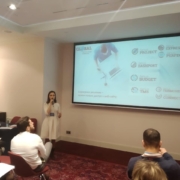What’s next? Trend-setting Models for Contemporary LSP Industry Discussed at 10th Meeting of Moscow Translation Club
The 10th meeting of the Moscow Translation Club, the LSP sector’s largest such event, reflected the increasing maturity of artificial intelligence (AI) and machine translation. A global push toward automation and AI is now underway, as many speakers made clear at the event, which was held December 6 at the Mercure Moscow Paveletskaya Hotel. The focus is now on how to integrate AI into LSP practices fairly and universally.
Participants had the opportunity to hear and meet with over 150 leading LSP executives and management teams during one-on-one and small-group meetings. Workshops addressed near- and long-term projections for a wide range of professional translation services, and topics such as content generation, multimedia localization and collaboration with educational establishments to mentor talented young linguists.
The keynote speakers and panel discussions increasingly focused on the significant role expected to be played by machine translation and AI solutions, which for many years have been considered too futuristic and insufficiently practical to play a meaningful part in the translation process.
Janus Worldwide was featured in the Business Track session, where the company delivered two opening talks.
CEO Konstantin Josseliani laid out the importance of integrating AI-driven solutions as a fundamental business strategy pillar. “In today’s era of digital transformation, our global LSP community must tackle multiple technological challenges in order to foster growth, AI differentiation and added value for the customer. An innovative mindset and growth-oriented corporate culture is no longer an advantage, but rather an established baseline for sustainable business growth,” he said.
Global Key Account Manager Natalya Rudinskaya served on a panel discussing the opportunistic functionality of the new Global Technology Platform 2.0, reviewing practical insights into AI solutions for translation and localization and their influence on routine LSP operations, as well as the advantages, risks and future prospects they present for translation and localization providers. “It’s an exciting time for all of us,” she said. “We are facing a new ecosystem that features various AI technological solutions, all designed to shape a new approach to the translation process and drive the entire LSP industry forward.”
Overall, the speakers were all optimistic about the breakthrough prospects of AI and machine translation for the LSP industry. Guest speaker Esther Bond, Research Director at Slator, explained the general trends in the contemporary translation landscape. She envisioned trend-setting shifts to digital transformation that would produce something very different from the way people think of translation services today.
This was a memorable tenth anniversary meeting of the Moscow Translation Club, which, as always, offered a great opportunity to meet industry peers, network and enjoy the entertainment program that the organizers put on for all guests.





